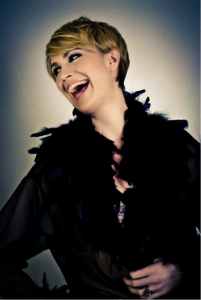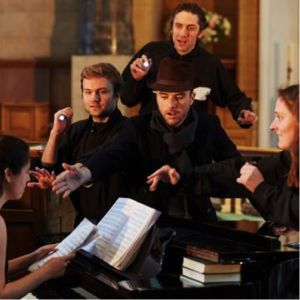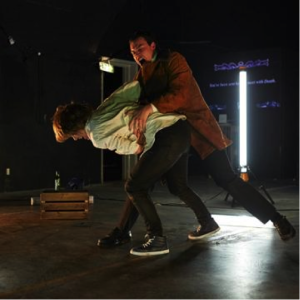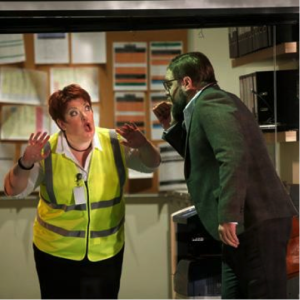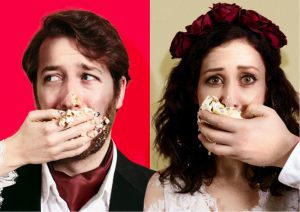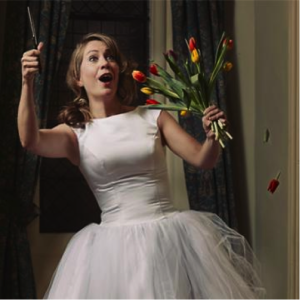Artistic Director of Pop-Up Opera
[Clementine Lovell]
This summer, Pop-Up Opera return with a rarely-seen opera from the late eighteenth century, Cimarosa’s Il Matrimonio Segreto (The Secret Marriage).
Continuing to challenge the way opera is traditionally performed, Pop-Up Opera take their productions into unusual spaces, making them fun, fresh and intimate.
Il Matrimonio Segreto tells the tale of a rich Italian businessman as he attempts to marry off one of his daughters to a mad English toff with disastrous results. Packed with tunes and matrimonial mayhem, this exciting story about following your heart makes for a perfect summer opera filled with Pop-up Opera’s special humour, sparkle and fun.
The opera’s premiere in Vienna was the occasion of the longest encore in operatic history: Leopold II was so delighted that he ordered supper served to the company and the entire opera repeated immediately after.
Here’s a short interview with Pop-Up’s Artistic Director, Clementine Lovell…
How would you describe Pop-Up Opera to a stranger at a party?
We take opera into unexpected venues like barns and tunnel shafts and make it fun and engaging, and people who are not keen on or have never been to opera come and see it and are surprised how much they love it.
Do you find people concerned that they wouldn’t understand what’s going on? Isn’t all opera in a foreign language, for example? How accessible is it?
Our projected captions have become part of our signature style. We believe that you can still make opera accessible when performed in the original language. The music, the intentions of the actors, the interaction between the characters and the power of the drama get the story across. The captions are there to compliment, not to detract. They keep the audience broadly abreast of the story but don’t demand their attention all the time. With a comedy the captions can add another layer of humour, and we can play around with the modern context. In a drama we kept the translation more ‘straight’ but still with the same approach of captions rather than a full text translated into continuous surtitles.
Do you think Pop-Up has a distinctive style?
Yes, we have definitely developed our own Pop-up Opera style. Our aim is to get the story across and to engage the audience, and our style has evolved around this. We adapt the productions to embrace each venue, so every night is different. The performance spaces vary wildly in size, shape, acoustic, feeling. We get in to the space on the day and start working out the entrances, exits, how to involve the audience… The performers have to think on their feet and be willing to allow some freedom and spontaneity. I think this keeps it fresh and creates a very special atmosphere. Our captions mentioned above are definitely a strong trademark, but we also put emphasis developing characters that the audience can root for and care about.
How was the company formed?
When I began training as an opera singer I had mixed reactions from my friends. Opera wasn’t really their thing, one even claimed to be ‘allergic’ to it. That stayed with me, and I wanted to prove them wrong, to show them that opera could be magical, hilarious, devastating or moving. I founded Pop-up Opera in 2011, on my return from living in Italy. Opera is so much a part of Italian culture, so broadly appreciated, and is performed everywhere, not just in the big houses. I grew up in a small village in the UK miles from an opera house. We never went to see it, it wasn’t an option. My uncle has a barn where he hosts folk and blues events and we put on an opera there for a largely non opera going audience. They loved it. It made me think about how the setting can have a bearing on people’s enjoyment, or their willingness to give it a go.
I made the decision to try and build a company that could stand on its own two feet financially rather than relying on funding. I didn’t have any money to invest or form a basis for the company, so I started it as a profit share, and convinced 12 venues to work with us for the initial season, a few of which guaranteed us a fee. I found a stage director and singers who were excited about the project and willing to take the risk and give it a go. The production was a success and the word began to spread. During the second year I sat down and made a business plan and worked out what we would need to achieve to stay afloat and meet our running costs. Once I felt confident the performances would bring in enough revenue, I moved away from profit share to offering our singers and directors fees.
What do you think has been your greatest achievement so far? And your biggest nightmare – what, in the past, has gone wrong?
The company that has grown significantly over the last 5 years and is able to stand on it’s own feet. The strong partnership I have with my co-producer Fiona Johnston, and the work we have put into building the company forms its foundation. We put a lot of work into approaching venues and and nurturing a relationship with them and with our audiences. We now have many regular venues as well as new ones, and will do around 90 performances this year. High points include getting ecstatic emails back from previously skeptical audience members after our shows, seeing 6 year old children enthralled by Cosi fan tutte, and hearing the full orchestra play the first few notes of Figaro as the curtain went up on the amazing set of our co-production with Kilden concert house in Norway. We are also proud to be a company that cast and crew want to work with, that we offer a fun and supportive environment for them, and a platform for talented people.
There have been many challenges and moments of despair. Initially Fiona and I were juggling producing with other jobs until we could pay ourselves. The costs of running a company are enormous and it’s both terrifying and liberating to be self reliant financially. We are covering costs but it’s a struggle and frequent cause of anxiety. We have learnt business and management skills on the job and have dealt with many challenging situations. The company is so full of potential and is growing in size and strength, but it’s still fragile. We have a lot of people reliant on us and so many variables. It can be very stressful. If we weren’t passionate about it, it just wouldn’t happen.
Is there something that you yearn to do – a certain performance or venue?
I would love to partner up with a larger organisation in the UK, so we could collaborate together and share our strengths and experience, to bring opera to an even wider audience. We would also love to reach more disadvantaged schools, communities and areas of the country which at the moment isn’t financially viable for us or them. There are operas we would love to do but we are currently limited by budget and by the number of people we can fit into our 9 seater tour bus. We consider carefully what productions will work for us, and take into account many factors. We have to balance artistic and creative drive with financial and logistical constraints. We also have to think about what will work in our venues and with piano reduction instead of orchestra.
Who inspires you and do you have a favourite composer?
Many people inspire me. I constantly meet interesting and inspiring people through my work. My mentor Steve Robertson inspires me because he has achieved so much and works non stop but remains positive and always willing to help others. I am inspired by many women who I know and/or look up to. Whether it’s juggling family and career, nurturing, creating, grafting, defying… there are some amazing women in my life or who I meet or hear about that inspire over and over.
If I was forced to pick one composer it would have to be Mozart.
The current production of The Secret Marriage – what is it about? Is it a comedy or tragedy?
It’s a comedy. Basically (in our version) a rich Italian businessman attempts to marry off one of his daughters to a mad English toff with disastrous results. As our brilliant stage director Max Hoehn says, “It’s a piece that revels in anarchy. The story is driven by this collision of eccentric and forceful personalities who are trapped in the ultimate engagement party from hell”.
[The Secret Marriage poster]
How long is the rehearsal process – how does it all come together?
We have about a month of rehearsal time in total for each new production. Our wonderful musical director Berrak Dyer spends the first week working with the cast on the music only. The quality of the performance musically is very important to us. We then have around 3 weeks to stage the piece. The specific approach depends on the stage director we are working with, but they will be aware that the production needs to be flexible and adaptable for the different spaces yet with a strong structure. They will sometimes need to juggle rehearsing two casts, particularly when there will be up to 40 performances over a run. Our stage director also collaborates with Harry Percival who writes our captions. They will discuss ideas and aesthetic, and how the captions will be spaced during the action. The rest of our captions team will need to learn the show and the timing of captions operation for the performances. Props are sourced by Fiona in the lead up to and during the rehearsal period, although for Matrimonio we are excited to have a new team member on board in charge of costumes, another Fiona (Rigler). We constantly have to think outside the box due to budget restrictions and this forces us to be creative.
Does a venue find you or are you always on the lookout for unusual places to perform and you approach them?
Initially we had to approach many many places to find venues, but now many of our venues come to us. Word of mouth is a powerful thing and lots of people approach us off the back of seeing one of our shows. We are always on the lookout for new and interesting venues though!
What’s next for Pop-Up, in the short and long term?
Il matrimonio segreto opens on 18th May in London at Off Quay near East India dock. We will tour the production around the UK until the end of July. In the autumn we’ll be staging Hansel & Gretel which will open on 21st September in the Brunel Museum Thames Tunnel Shaft and will tour until late November.
In general it’s a very exciting time for the company. As well as our core productions touring 90 shows a year, we have also began to collaborate with larger organisations, such as the amazing Kilden concert house in Norway where we upscaled but still stayed true to our ethos and style. We hope to take on more projects and partnerships like this as well as continuing to bring our productions to intimate and usual venues around the UK. Ultimately though, the sky’s the limit. Anything is possible if you believe in it enough and are prepared to work hard to make it happen.
Running time 2 hours 10 minutes, plus interval (tbc)
Website www.popupopera.co.uk
Twitter @PopupOperaUK
Facebook /popupopera
Director Max Hoehn
Producers Fiona Johnston and Clementine Lovell
Musical Director Berrak Dyer
Tour Dates: www.popupopera.co.uk

